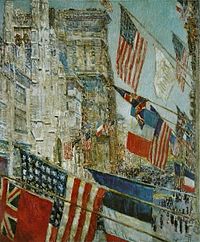In everyday English usage, allies are people, groups, or nations that have joined in an association for mutual benefit or to achieve some common purpose, whether or not explicit agreement has been worked out between them. When the term is used in the context of war or armed struggle, such associations may also be called allied powers, especially when discussing World War I or World War II. A formal military alliance is not required for being perceived as an ally—co-belligerence, fighting alongside someone, is enough. According to this usage, allies become so not when concluding an alliance treaty but when struck by war. When spelled with a capital "A", the word "Allies" usually denotes the countries who fought together against the Central Powers in World War I, or those who fought against the Axis Powers in World War II. The term has also been used by the United States Army to describe the countries that gave assistance to the South Vietnam during the Vietnam War. More recently, the term "Allied forces" has also been used to describe the Coalition of the Gulf War, as opposed to forces the Multi-National Force in Iraq which are commonly referred to as "Coalition forces" or, as by the George W. Bush administration, "The coalition of the willing". The Allies in World War I (also known as the Entente Powers) were initially the British Empire, France, Russia, Belgium, Serbia, Montenegro, and Japan, joined later by Italy, Portugal, Romania, the United States, Greece, and Brazil. Some, such as Russia, withdrew from the war before the Armistice due to revolution or defeat by the Central Powers.




Kommentieren
0